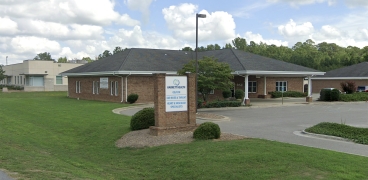Welcome to Cape Fear Valley Health’s guide to hypertension, a common yet often silent condition characterized by high blood pressure. Learn about how we help to manage high blood pressure to maintain heart health and prevent serious complications.
What is Hypertension?
Hypertension, or high blood pressure, is when the force of blood against artery walls is too high consistently. It's measured in millimeters of mercury (mm Hg), and a reading of 130/80 mm Hg or higher indicates hypertension. This is how blood pressure is categorized based on American Heart Association (AHA) guidelines:
- Elevated: 120-129/<80
- Stage 1: 130-139/80-90
- Stage 2: 140/>90
- Crisis: 180/120
There are two types: primary and secondary.
Primary hypertension, the most common, develops gradually without a clear cause. Factors such as genetics, poor diet, lack of exercise and stress contribute to its development.
Secondary hypertension appears suddenly, caused by underlying conditions such as kidney disease, adrenal gland tumors or certain medications.
Over time, uncontrolled hypertension can damage your heart, arteries, kidneys and other organs. This damage includes heart attack, stroke, aneurysm and heart failure risks.
Healthy lifestyle choices, such as a balanced diet, regular exercise and avoiding smoking, can prevent or manage hypertension. In some cases, medication such as ACE inhibitors, ARB drugs or diuretics is necessary for control.
Understanding your specific type of hypertension and its causes is essential for effective treatment and prevention of serious health issues.
Hypertension Signs and Symptoms
Most people with hypertension experience no symptoms, even with dangerously high blood pressure levels. However, some may notice:
- Headaches
- Shortness of breath
- Nosebleeds
Remember, these symptoms typically don't appear until hypertension reaches a severe or life-threatening stage. That’s why regular blood pressure checks are crucial for early detection.
When to Seek Care for Hypertension
Regular check-ups are essential, even without symptoms; hypertension often shows no signs.
For blood pressure consistently at or above 130/80 mm Hg, consult your doctor for potential treatment options.
Seek immediate medical attention if your blood pressure exceeds 180/120 mm Hg. This can indicate a serious condition called hypertensive emergency.
Monitor for symptoms such as severe headaches, shortness of breath or nosebleeds, which could signify severe hypertension stages.
If experiencing unusual symptoms such as confusion or blurred vision with high readings, seek urgent medical advice.
Hypertension Diagnosis at Cape Fear Valley Health
Diagnosing hypertension starts with a simple, painless blood pressure measurement. Blood pressure is measured using a cuff and a gauge, displaying the pressure in millimeters of mercury (mm Hg). If the initial reading is high, we'll schedule additional readings over a few weeks, as blood pressure fluctuates naturally.
We also conduct a physical examination and review your medical history, including any family history of hypertension or heart disease. This helps us understand any genetic predispositions or lifestyle factors contributing to high blood pressure.
We may recommend further tests, such as cholesterol levels, kidney function and other possible underlying conditions. An electrocardiogram (EKG) might be conducted, particularly if you're experiencing symptoms or have a family history of heart disease.
Your age and overall health determine the frequency of blood pressure checks. Generally, adults age 18 and older should have their blood pressure checked at least every two years. If you're at a higher risk due to factors such as obesity or a family history, annual checks are advisable.
Lastly, our team will discuss lifestyle factors, such as diet, exercise and smoking habits. These are integral to both hypertension prevention and management.
Hypertension Treatment at Cape Fear Valley Health
At our Heart & Vascular Center, treating hypertension involves a combination of lifestyle modifications and medication, tailored to your specific needs. Initially, we focus on lifestyle changes, such as:
- Adopting a heart-healthy diet low in sodium
- Engaging in regular physical activity
- Maintaining a healthy weight
- Quitting smoking if applicable
These changes can significantly lower blood pressure and reduce the risk of heart disease.
If lifestyle modifications aren't sufficient, or if your hypertension is severe, we may prescribe medication. The choice of medication depends on your overall health, the severity of your hypertension and any underlying conditions. Commonly used medications include:
Angiotensin-converting enzyme (ACE) inhibitors, which reduce the production of angiotensin II, a chemical that narrows blood vessels.
Angiotensin receptor blockers (ARBs) block the effects of angiotensin II on blood vessels.
Calcium-channel blockers relax blood vessels by affecting calcium used in heart muscle and blood vessels.
Diuretics help to reduce the body's fluid pressure by increasing urine output.
We closely monitor your response to treatment, adjusting medications as needed. Regular follow-up appointments are essential for controlling blood pressure and minimizing risks of heart attack, stroke and other complications. Our approach is patient-centered, focusing on individualized treatment plans for the best outcomes.




